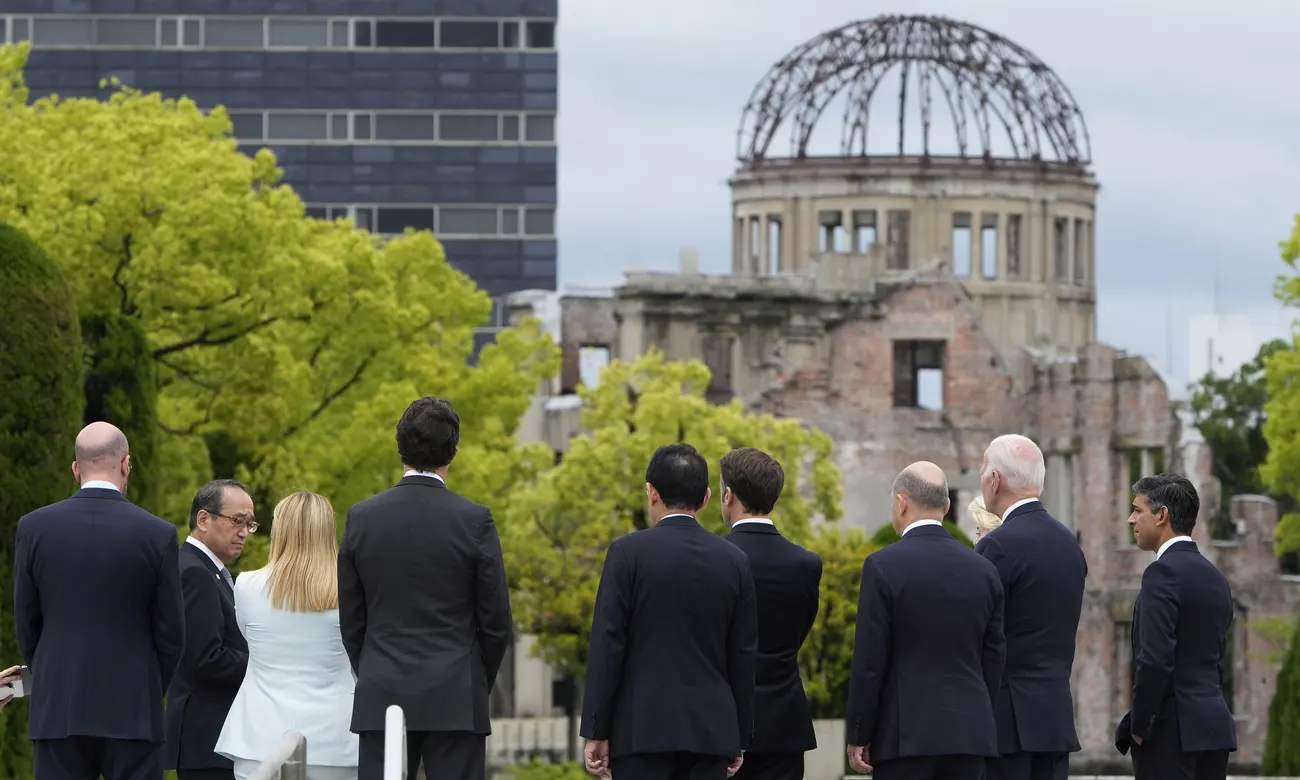“I hope that here in Hiroshima, the G7 and leaders from elsewhere will show their commitment to peace, which will be remembered in history.” - Japanese PM Kishida
“We will once again confirm our resolve to work for a world without nuclear weapons and we hope to transmit to the world our strong determination to protect the free and open international order based on the rule of law,” Japanese PM Kishida told reporters as he left for Hiroshima.
Joe Biden became the second sitting US president to visit Hiroshima, after Barack Obama in 2016, while Rishi Sunak is the first British prime minister to visit the site of the world’s first nuclear attack. An estimated 60,000 to 80,000 people died instantly, but by the end of the year, the death toll had risen to 140,000 as more succumbed to burns and illnesses caused by exposure to radiation.
G7 leaders have laid flowers at a memorial to the victims of the US atomic bombing of Hiroshima in a sombre opening to a summit overshadowed by fears of a potential nuclear conflict in Ukraine.
As the heavy early morning rain began to ease, the summit’s host, Japanese prime minister Fumio Kishida, and his wife, Yuko, welcomed leaders and their spouses at the entrance to the city’s Peace Memorial Museum, where they viewed graphic reminders of the attack on the city on 6 August 1945 and its gruesome aftermath.
 |
| G7 leaders in front of the Atomic Bomb Dome at the Peace Memorial Park in Hiroshima, Japan. Photograph: Franck Robichon/EPA |
The Japanese leader – whose wife wore a gold pin shaped like an origami crane, a symbol of the city’s nuclear legacy – has said that achieving a world free of nuclear weapons is his “life’s work”.
Yuko Kishida (center), wife of Prime Minister Fumio Kishida, is pictured along with the spouses of her husband's counterparts on the sidelines of a meeting of Group of Seven foreign ministers in Hiroshima in April 2016. | KYODO
Kishida’s chairmanship comes at a crucial time for the group and the world. The G7, once derided as a photo-op for leaders of a global order whose time has passed, has assumed new vigor and relevance in recent years. This is, as Kishida said upon his departure for Hiroshima on Thursday, “a historic crossroads.” With leadership and follow-up, the group could again serve as a venue to coordinate action on critical issues.
It is not clear what other mechanism could serve that purpose today.
When formed 50 years ago, the G7 countries represented nearly two-thirds of global wealth. Today, they account for about 44% of the global economy. -- Edit in 'The Japan Times'
Its status as international economic manager had been eclipsed by the Group of 20, formed in the wake of the Global Financial Crisis in 2007-08. The G7 has a whiff of nostalgia to it — the leading countries of the Cold War era gathering to show the world (and themselves) that they still set global policy.
That assignment and those ambitions have assumed new urgency since the invasion of Ukraine. The G7 has become the venue where the forces that back the existing global order convene to plan coordinated action. Prime Minister Kishida has repeatedly declared that Russia’s aggression against Ukraine is a matter of concern for the entire world and a challenge to the rules and principles of the entire international community.
It is why he has called the meeting “the most important in Japan’s history.”






No comments:
Post a Comment